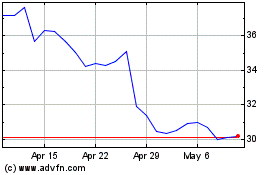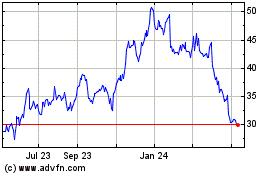By Dan Strumpf and John D. McKinnon By
President Donald Trump said he was working with Chinese
President Xi Jinping to keep ZTE Corp. in business, throwing an
extraordinary lifeline to the stricken Chinese telecommunication
giant that has been laid low by U.S. moves to cut off its
suppliers.
The surprise intervention comes less than a month after ZTE was
hit with an order banning U.S. companies from selling components to
the Chinese firm. The U.S. Commerce Department directed companies
to stop exporting to ZTE in mid-April, saying the Chinese firm
violated the terms of a settlement resolving evasion of U.S.
sanctions against Iran and North Korea.
The Commerce Department is currently reviewing ZTE's request for
a stay of that order.
Mr. Trump said in a tweet that he is working with Mr. Xi to get
ZTE "back into business, fast," and the Commerce Department has
been instructed to "get it done." Mr. Trump added: "Too many jobs
in China lost."
Mr. Trump's comments about the company and concern about Chinese
jobs come as the U.S. and China are locked in high-stakes
negotiations over trade and intellectual property. Both countries
are threatening to slap billions of dollars of tariffs on the
other's products. Mr. Trump has regularly blamed China for U.S. job
losses and Beijing's policies for the U.S. trade deficit, making
his shift in tone Sunday notable.
Moreover, U.S. concerns about ZTE go beyond its evasion of
sanctions. For years, the U.S. has accused equipment made by
Shenzhen-based ZTE and its larger crosstown rival Huawei
Technologies Co. of being a national security threat, an accusation
that both companies have denied. The U.S. has largely blocked both
companies from selling telecommunications gear in the U.S.
Nodding to those concerns, Rep. Adam Schiff of California, the
top Democrat on the House Intelligence Committee, responded on
Twitter to the president's remarks: "Our intelligence agencies have
warned that ZTE technology and phones pose a major cyber security
threat." He added, referring to Mr. Trump: "You should care more
about our national security than Chinese jobs."
ZTE, which relies on billions of dollars in component imports
from U.S. tech titans such as Qualcomm Inc. and Intel Corp. has
warned the ban threatened its survival. Last week, the company said
it had ceased major business operations.
A person close to ZTE said Sunday: "ZTE has noticed the tweet
from President Trump, and welcomes this latest progress. Next,
under the guidance of the Chinese government, ZTE will continue to
communicate with relevant parties including the U.S. Department of
Commerce to facilitate the final resolution."
The Wall Street Journal reported Saturday that in its efforts to
have the ban stayed, ZTE has told U.S. authorities that process and
human-resource errors, not a plan of systematic deception, were
responsible for the lapses in fully complying with its 2017
settlement, according to a person familiar with the matter. The
company also believes that the ban is a disproportionate penalty,
this person said. The Commerce Department has said it was reviewing
the stay request.
The Commerce Department and the White House didn't immediately
respond to requests for comment.
In a subsequent tweet at midafternoon Sunday, Mr. Trump said
that China and the U.S. "are working well together on trade" but
"it is hard for them [China] to make a deal that benefits both
countries." He added: "But be cool, it will all work out!"
The sudden sales ban placed the company at the sharp end of a
rising trade dispute between Washington and Beijing that has
included tit-for-tat tariffs. Technology has become a focus of
tensions, with the U.S. accusing China of transferring key
technologies back home and unfairly supporting domestic
champions.
Chinese representatives complained to their U.S. counterparts
about the ban during a recent visit by a U.S. trade delegation to
Beijing. The export ban was expected to figure in another round of
trade talks between the two sides in Washington.
Some Wall Street observers have speculated that the
administration hoped to use the ZTE sanctions as leverage to soften
Chinese resistance in other trade negotiations.
One possible indication of that was the Commerce Department's
failure to impose about $300 million in fines it was eligible to
collect when it announced the penalties on ZTE earlier this year.
The Commerce Department also has signaled in recent days that was
trying to expedite ZTE's appeal, suggesting the agency was
sensitive to the urgency of ZTE's situation.
It said last week that its Bureau of Industry and Security,
which oversees export controls, was reviewing ZTE's appeal and
would give it "prompt consideration." It has said that BIS is
exercising its discretion to grant ZTE an opportunity to
appeal.
ZTE employs roughly 75,000 people world-wide and is the
fourth-largest mobile phone vendor in the U.S., selling 19 million
phones in America last year, making it the firm's biggest
market.
Backed by the Chinese government as a tech national champion,
ZTE works alongside Huawei in the race to develop next-generation
5G wireless technology -- an area in which Qualcomm is viewed by
Washington as a crucial U.S. competitor. ZTE sent 11
representatives to a recent industry-sponsored meeting in India to
discuss 5G specifications, according to conference records.
In 2017, Huawei led the global telecom-equipment market with a
27% share, followed by Finland's Nokia Corp. at 17% and Sweden's
Ericsson AB at 13%, according to research firm Dell'Oro Group. ZTE
was fourth with 10%. But in the U.S., Ericsson and Nokia each held
a 48% market share.
Write to Dan Strumpf at daniel.strumpf@wsj.com and John D.
McKinnon at john.mckinnon@wsj.com
(END) Dow Jones Newswires
May 13, 2018 16:14 ET (20:14 GMT)
Copyright (c) 2018 Dow Jones & Company, Inc.
Intel (NASDAQ:INTC)
Historical Stock Chart
From Mar 2024 to Apr 2024

Intel (NASDAQ:INTC)
Historical Stock Chart
From Apr 2023 to Apr 2024
